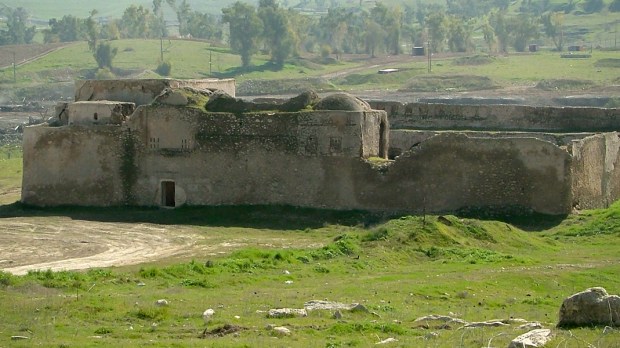I had just finished a letter of condolence to dear Muslim friends in a war-torn country in the Middle East. An elderly couple I had met decades ago, and with whom I have stayed in touch over the years, has suffered far beyond what I can imagine. Their oldest son was kidnapped by the “opposition,” and the family has not seen him for more than three years. Two grandchildren separately took their lives in their hands to go on one of those notorious refugee boat trips to Europe. A son-in-law had been arrested by the government. The wife/mother/grandmother had been the strength of the family. A joyful, outgoing woman, who, with her husband welcomed me as a guest years earlier, got seriously ill, but decent medical care was just not available and she died. Her death has touched me deeply and is devastating to her family.
As soon as I finished the letter, I read that the ancient Dair Mar Elia Monastery in Iraq had been destroyed by ISIS. It is frightening how quickly grief can become rage. The Dair Mar Elia Monastery was one of the oldest in the Middle East, dating back to the sixth century. Built between the years 580 and 590, the monastery was erected after Muhammad was born (ca. 572) but before he began to receive the Qur’an (609). The monastery had a long and varied history and was now basically a ruin.
There had not been monks living there for many years. Over the years it had been used as a headquarters for the Iraqi Republican Guard and later even by American troops. Nevertheless, the place was always looked upon by the local populace as a holy place. Iraqi Christians and Muslims used it as a place of prayer.
In another of many acts of nihilism, ISIS leveled what was left of the monastery. Satellite photos show that the walls and remaining buildings of the monastery had been bulldozed. The viciousness and evil of ISIS confounds the imagination. If one tries very hard, one can possibly understand — but never approve of — the destruction of the statues of Buddha at Bamiyan and the destroying of ancient Mesopotamian statues. There is a long tradition in ancient Judaism, Christianity and Islam of destroying “pagan idols.” But the monastery of Dair Mar Elia was none of these. That can only increase the rage that one feels at such barbarism.
But there is a great sadness too. There is a great sadness in seeing one of the oldest places of prayer in the Middle East destroyed. There is also a great sadness in seeing how ISIS tries to drive a wedge between Muslims and Christian. The Qur’an is a very diverse book. It is often quite critical of Christians and what it thinks Christians believe. However, it also speaks of “monasteries, churches, synagogues and mosques where the name of God is often commemorated” (22:41). It speaks of Christian as “those who are nearest to you in love” (5:83) and notes “Among the People of the Book [Christians and Jews] there is a community who stands by its covenant, who recites the verses of God during the night and prostrates [before him] … they believe in God … vying with each other in good works. These are among the righteous” (3:114–115).
The criminal nihilism of ISIS and similar groups has not limited itself to destroying Christian holy places. We mentioned earlier the giant statues of Buddha at Bamiyan. ISIS also blew up the Tomb of Jonah in Mosul, which had been a mosque and place of pilgrimage for both Muslims and Christians.
Paul, in his letter to the Romans, warns us “do not repay evil with evil” (Rom. 12:17). Faced with the destruction of the monastery of Dair Mar Elia, it is natural to feel a desire for revenge, a desire to outdo one destruction with more destruction. It is something we must resist. We must do all we can to resist the nihilist methods of ISIS and other groups, but Christians and Muslims of goodwill must resist the understandable human temptation to respond in a similar way.
Many marvelous European cathedrals bombed in World War II have been restored to their former glory. We need to work and pray that the same may one day be the case with the monastery of Dair Mar Elia, the tomb of Jonah, the Buddhas of Bamiyan, Palmyra, and all the other spiritual treasures that have been destroyed.
Rev. Elias D. Mallonis a member of the Franciscan Friars of the Atonement. He obtained a licentiate degree (STL) in Old Testament studies and a PhD in Middle Eastern languages from the Catholic University of America. His articles appear regularly inAmericaandONEmagazines. Elias is the external affairs officer for the Catholic Near East Welfare Association (CNEWA), which supports charitable, educational, health and development projects in the Middle East, Ethiopia, eastern Europe and southern India. Here he is responsible for representing CNEWA at the UN, research and interreligious dialogue.

